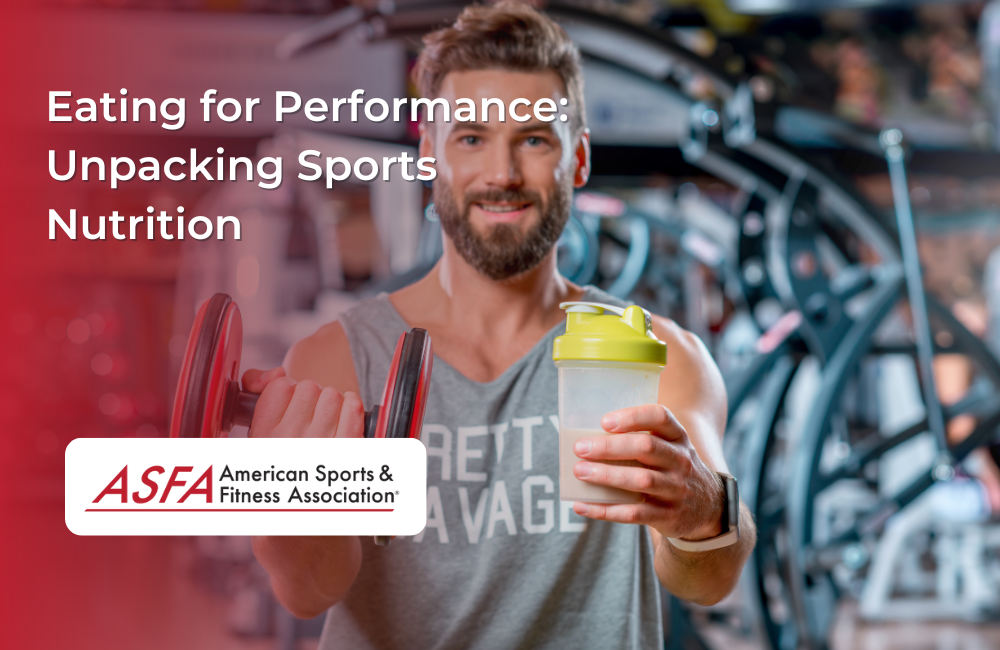
Eating for Performance: Unpacking Sports Nutrition
Whether you’re an athlete or not, the moment your body starts to feel tired, it’s time to eat. Your energy levels and mood can be greatly affected by what you put in your body. Nutrition plays a key role in active lifestyles and sports performance. In this blog post, we will look at how different nutrients can help with performance and recovery when exercising.
What is sports nutrition?
Sports nutrition is a specialized field of nutrition that focuses on optimizing an athlete's diet to improve their athletic performance. It involves designing customized nutrition plans for athletic training, competition, and recovery that maximize energy, strength, and overall health.
Sports nutrition is not just about eating the right foods, it's also about timing and quantity. The goal is to consume the right nutrients in the right amounts at the right time to provide the energy and nutrients needed to maintain and repair muscle tissue, prevent muscle breakdown, and reduce fatigue during training and competition. This can help athletes improve their endurance, speed, power, reaction time, and overall performance.
Sports nutrition plans typically include a combination of macronutrients (carbohydrates, protein, and fats) and micronutrients (vitamins and minerals), as well as fluids to maintain hydration. Athletes often require more calories than the average person, and the distribution of macronutrients in their diet may differ from traditional nutrition guidelines. For example, endurance athletes often require a higher carbohydrate intake to maintain glycogen stores, while strength athletes require more protein to rebuild muscle tissue.
Nutrition is more than calories and macronutrients.
Food is fuel for your body, but it's also a complex substance that contains many different nutrients. The word "nutrient" refers to any substance that can be used by the body for growth or energy, such as proteins, fats, carbohydrates, and water. These are called macro-nutrients because they make up most of our diet (macro means large). Micronutrients include vitamins and minerals (micro means small).
In addition to providing us with these essential nutrients--and calories--foods contain other substances known as phytochemicals which have been shown to have health benefits beyond basic nutrition. Phytochemicals include antioxidants like lycopene found in tomatoes or resveratrol found in red wine; flavonoids like quercetin found in onions or anthocyanins found in blueberries; carotenoids such as beta-carotene found in carrots or zeaxanthin found in kale/spinach etcetera...
The current research does not support a specific macronutrient ratio for everyone.
The current research does not support a specific macronutrient ratio for everyone. In fact, the USDA's Dietary Guidelines for Americans (2010), which are designed to help meet the needs of as many people as possible, recommend that 48-55% of total calories come from carbohydrates; 16-18% from fats; and 20-35% from proteins. For athletes and active people, these recommendations may be insufficient due to their high carbohydrate intake which can lead to impairment in insulin sensitivity with overconsumption of carbohydrates. In contrast, low carbohydrate diets have been shown to improve athletic performance when compared with higher carbohydrate diets because they reduce inflammation and improve blood glucose control. However, low carbohydrate diets also increase risk factors associated with heart disease such as increased LDL cholesterol levels.
Nutrition is also about timing, food quality, and hydration.
There are a few important things to keep in mind when it comes to eating for performance:
- Eat regularly. This means you should be eating at least three meals per day and one or two snacks throughout the day. The goal is for your body to have consistent access to nutrients, which will help you maintain energy levels and avoid hunger pangs that could result in poor decision-making (such as grabbing an unhealthy snack).
- Eat a variety of foods. You need protein, carbs, fats, vitamins, and minerals from whole foods like fruits & vegetables (not just calories). Eating a wide range of different types of food helps ensure all your nutritional needs are being met so that one type of nutrient doesn't become deficient while another becomes excessive--a balance that may lead to poor performance on its own but can also cause other health problems down the road if left unchecked (for example too much sugar leads to insulin resistance).
Food is not just food - it's fuel for your body!
Food is the most basic and essential form of energy, but it can also be so much more than that. In order to perform at our best, we need to make sure that we're getting enough nutrients from a variety of sources. This means eating enough calories (energy) while still getting all the vitamins, minerals, and other nutrients required by our bodies to function properly.
The idea that "calories in = calories out" is wrong because it doesn't take into account how those calories affect your body differently depending on what kind they are: carbohydrates vs fats vs proteins are metabolized differently by the body; some carbs cause insulin spikes which may inhibit fat burning; fats provide essential fatty acids necessary for many bodily functions including hormone production; protein helps build muscle mass which burns more calories even when at rest compared with carbohydrates alone! So if you want results from any diet plan: make sure there's enough variety!!
Conclusion
The sports nutrition market is a multi-billion dollar industry, but many of the products on the market don't actually improve performance. To get the most out of your training and achieve your goals, it's important to understand what works (and what doesn't).



